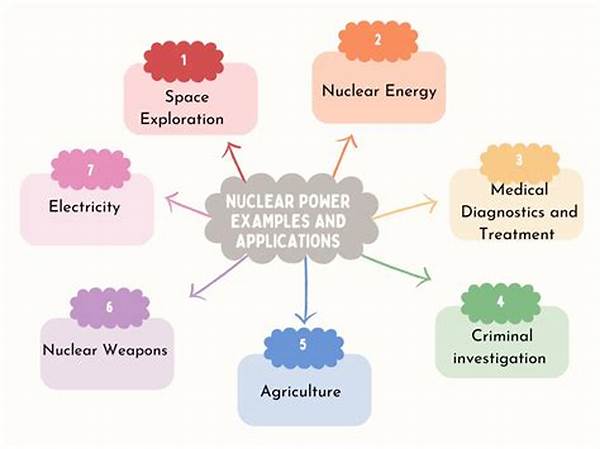In recent years, nuclear power has transcended its conventional role as a provider of base-load electricity to become a cornerstone of advanced technological applications. Leveraging the unique characteristics of nuclear energy, such as its high energy density and low greenhouse gas emissions, researchers and industry leaders alike are exploring innovative nuclear power applications that promise to revolutionize various sectors. These applications offer the potential to address some of the most pressing challenges of our time, including climate change, energy security, and sustainable development.
Advanced Nuclear Reactors
Advanced nuclear reactors represent a pivotal aspect of innovative nuclear power applications. These next-generation reactors are designed to achieve higher levels of efficiency, safety, and environmental stewardship than traditional reactors. Utilizing advanced fuels and coolants, they aim to minimize the risk of accidents while maximizing energy output. These reactors also play a crucial role in reducing nuclear waste and facilitating the recycling of spent fuel. By embracing advanced nuclear reactors, nations can enhance their energy independence and mitigate the adverse effects of climate change through cleaner energy production processes.
Furthermore, the international community is actively investing in the research and development of advanced nuclear reactor designs, including small modular reactors (SMRs) and micro-reactors, which boast enhanced modularity and flexibility. These innovative nuclear power applications are particularly well-suited for remote locations and countries with limited infrastructure, offering scalable power solutions tailored to specific regional demands. As nations strive toward sustainable energy systems, embracing these cutting-edge technologies is imperative.
Nuclear Medicine and HealthCare Innovations
Nuclear medicine stands as one of the most promising innovative nuclear power applications, revolutionizing diagnostics and treatment in healthcare. The use of radioisotopes in imaging techniques like PET and SPECT scans enables early detection of diseases such as cancer, enhancing treatment outcomes. Similarly, targeted radiotherapy offers effective cancer treatment while minimizing damage to healthy tissues, exemplifying the transformative potential of nuclear technology in medicine.
Radioisotopes employed in diagnostic processes, under the umbrella of innovative nuclear power applications, are instrumental in revealing intricate details of bodily functions and aiding in the assessment of treatment efficacy. This cutting-edge integration of nuclear science into medicine significantly improves patient prognosis and quality of life, reinforcing the value of nuclear applications beyond energy generation.
Industrial Applications of Nuclear Technology
The industrial sector benefits significantly from innovative nuclear power applications, particularly in non-destructive testing and material analysis. Techniques like neutron radiography and activation analysis facilitate the inspection of structural integrity and composition without causing damage, enhancing the safety and efficiency of various industrial processes. Moreover, nuclear reactors furnish essential isotopes used in material research and quality control, supporting advancements in technology and manufacturing. These applications underscore the versatility of nuclear technology beyond traditional energy production.
Food and Agriculture Advancements
In the realm of agriculture, innovative nuclear power applications manifest through techniques like food irradiation and pest control. Food irradiation leverages nuclear technology to eliminate pathogens and extend the shelf life of perishable goods, ensuring food safety and reducing waste. Additionally, nuclear-based pest control methods, such as the sterile insect technique, offer environmentally friendly solutions for managing pest populations without the adverse impacts of chemical pesticides. These advancements in food security and agricultural resilience illustrate the transformative role of nuclear applications in fostering sustainable practices within the food supply chain.
Space Exploration and Nuclear Energy
Within the ambit of space exploration, innovative nuclear power applications are poised to accelerate human activities beyond Earth. Nuclear propulsion systems promise unprecedented travel speeds, drastically reducing the time required for interplanetary missions. Meanwhile, nuclear reactors provide reliable power sources for spacecraft and extraterrestrial bases, enabling sustained scientific operations on distant planets and moons. By investing in nuclear-powered space technologies, humanity can expand its exploratory horizons and pursue ambitions of colonizing other celestial bodies, thereby extending the frontier of human knowledge and presence in the universe.
Environmental and Climate Change Mitigation
Addressing the global challenge of climate change necessitates the widespread adoption of innovative nuclear power applications as a sustainable solution. Nuclear energy’s low carbon footprint and reliable power output make it indispensable for reducing greenhouse gas emissions and transitioning towards a sustainable energy future. By complementing renewable energy sources, nuclear power can ensure grid stability and meet growing energy demands. Furthermore, advancements in nuclear technology contribute to the efficient capture and storage of carbon emissions, reinforcing nuclear energy’s pivotal role in combating climate change.
Summary of Innovative Nuclear Power Applications
In conclusion, innovative nuclear power applications hold transformative potential across multiple sectors, from healthcare and industry to space exploration and environmental management. By advancing nuclear technologies, societies can address key challenges such as energy security, climate change, and sustainable development, paving the way for a resilient and prosperous future. As nations recognize the profound benefits of nuclear innovation, collaborative efforts in research, policy, and investment will be pivotal in unlocking the full spectrum of nuclear potential.
The exploration of innovative nuclear power applications embodies a future-oriented approach, leveraging scientific advancements to foster a tighter integration of nuclear solutions into various aspects of modern life. This integration not only addresses persistent issues but also opens avenues for breakthroughs, underscoring the versatility and indispensability of nuclear energy in achieving long-term sustainability goals. As we harness the power of nuclear innovation, we must remain committed to ensuring safety, efficacy, and equitable access to these technologies for all.





